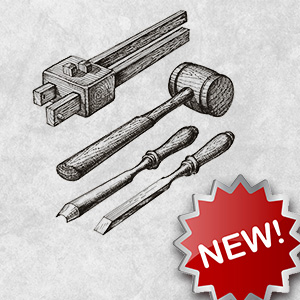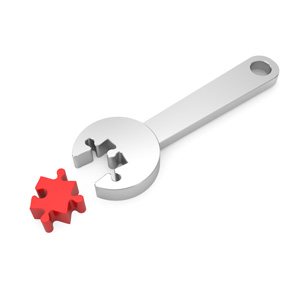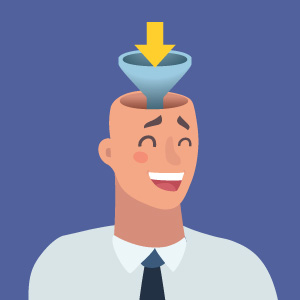In today's day and age, as an Instructional Designer, you are placed into many roles you're not fully, or even partially, qualified to do. Here are five things you need to understand to make your job, and life, simpler and easier:
 1. Know Your Limits
1. Know Your Limits
If you are like most Instructional Designers today, you have been thrown the kitchen sink.
There is so much on your plate, and no mere mortal can truly do all that is asked of you. And yet, you try.
Sometimes you succeed and other times you fail. People only remember your failures and you are not appreciated for what you were never hired to do or be...
As an Instructional Designer you probably want to please everyone including your clients, your managers and the learners that take your courses either online or in person.
What's (Unfairly) Expected of Today's Instructional Designers
You've been asked to:
a. Do a needs analysis
b. Interview the SMEs
c. Write the course
d. Author, or program, the course using advanced tools
e. Record your own voice-over with an untrained voice
f. Take your own videos
g. Record your own audio
h. Edit everything with tools you've never heard of
i. Publish to the LMS (Learning Management System) which you have no clue about
j. Test and approve everything you've done
Over a decade ago your job was done by:
a. Instructional Designers that wrote the course
b. Graphic artists that created or composited the graphics
c. Audio and video professionals who recorded and filmed everything
d. Audio and video editors
e. Authors, or programmers, who created the eLearning course
f. Quality control people who made sure it all worked
g. Everyone else who helped
All those people are now just YOU!!!
Ask Management for What You Need to Improve Performance
Wow! How did your world turn into this nightmare???
The answer is simple: bad economy, cost cutting and management unaware of what it takes to really do your job.
In many cases you just tried to do the best you could but that became increasingly difficult. You knew the courses could be better but you had no time and other courses were waiting to be done. You had NO bandwidth.
If you can do some of the tasks required, or even if you have the skills to do all of them, you should still let your management know where you need help in order to produce a better, more retentive course that improves performance. Keywords you need to know well: performance, retention and productivity... The less your learners retain, the worse the training is deemed.
The skills required to create good training are many and it's extremely rare to find professionals that can do every one of these tasks. Ask for help explaining the importance of the end result. If you don't, you'll be fighting an uphill battle that will only tire and demoralize you in which case no one wins...
2. Know What Gamification Is
It's buzzword time now: GAMIFICATION!!! Yaayyyy!!! Ding ding ding... WOW!!!
Uh, OK, flying monkeys be gone, let's talk about trends, words and results...
Do you know what Gamification is? Is it playing a game? Is it creating a game? Is it making your course like a game? The answer is sort of, but not really...
Gamification is using elements of game design in your stand-up or digital learning.
Elements of Game Design
"Elements" means components or pieces of game design. For example, here are some elements of game design which can easily apply to learning:
a. Video
b. Audio
c. Interactivity
d. Storytelling
e. Special effects
f. Engagement
g. Assessments or skills testing
g. Gathering of points, badges, leader boards, etc.
Gamification Is Nothing New
 Gee, don't these already exist in classroom and digital learning? Why yes, they do. Amazing, isn't it? You already know elements of game design and gamification.
Gee, don't these already exist in classroom and digital learning? Why yes, they do. Amazing, isn't it? You already know elements of game design and gamification.
These elements have been around for decades. But clever new phrases make people think it's new! But, it's not. Been there, done that.
If you understand this, you are now an expert in Gamification and can see through the hype that any vendor is spewing at you.
Elements of game design have existed for many decades. It's not a mystery and it's all about engagement and retention... It always is and it always has been.
3. Know Your Business or Agency
This is an area that puts Learning and Development professionals in constant fear of being laid off.
If you don't understand the basics of the business or agency you work for, you won't be perceived as having any value when the hard times hit.
This is why the top two departments that get laid off during economic downturns are Marketing and Training.
We've had this discussion often on our eLearnChat show.
 The more you know about the business processes, activities, tasks, and goals of your company, the more valuable you become.
The more you know about the business processes, activities, tasks, and goals of your company, the more valuable you become.
For instance, if you work in:
- an Operations group, then it's important to become familiar with the workflow and processes.
- Manufacturing, then you should learn as much as you can about how your products are made and sold.
- Insurance or Finance, then try to understand how policies and money work.
Wherever your are, make it a point to learn as much as you can. It will help you develop better training and also to make an impact on the company's bottom line.
If you don't... Let's not ponder that now. Give it your all and learn what your place of employment does...
4. Know What Your Authoring Tool Can Do
If you develop digital learning or media-based learning, it would really help your writing if you knew the capabilities of the authoring tool or video editor that your team is using (or that you need to learn).
 Authoring tools come in many different flavors. Here are some of the top ones:
Authoring tools come in many different flavors. Here are some of the top ones:
a. iSpring
b. Lectora
c. Articulate Storyline
d. Captivate
e. Flow
There are many more. These tools range from simple/easy to much more powerful in terms of features and capabilities.
I'll keep this one short: understand the feature set of the tools your company uses. Become familiar with what can or can't be done. Then write or create appropriate content for the course you're trying to develop.
Many tools have tutorials or webinars online. Do your best in learning these tools and your abilities to create content will improve dramatically.
5. Understand How People Learn
Ah, this is one of my favorite subjects, how we perceive and retain information. The cognitive side of things. It's time for a super-brief primer on neuropsychology....
Information goes into our brains through the senses, including vision, hearing, smell, taste and touch. In essence, these are all a series of patterns which enter the brain through one of our senses and then get stored in our cortex (our memory center).
Things get stored as memories which contain emotions and other properties. The stronger the emotion, the more we retain it and remember. The less powerful the sense or emotion, the less we remember or retain it. We may even forget it completely.
 Ta-dah, complex neuroscience in a nutshell!!!
Ta-dah, complex neuroscience in a nutshell!!!
If you create training that can trigger an emotional response of some sort, there is a very good chance that it will be retained or remembered for a very long time.
If you develop something boring, non-engaging or out of context to the learner, it will most likely be forgotten or placed way low in the cortex under a folder named, "BORING." You don't want to create "boring" content, trust me...
So when you're creating content, think emotion. Think retention. Think performance improvement and think engaging.
If you can write scenarios, or stories, with some emotional impact, or some "gotcha!" moment that ties something together for a learner, then you've succeeded in what you set out to do...
Summary: What an Instructional Designer Needs to Know
You have a demanding job. Try to control as much of it as you can. Remember that it all comes down to engagement, retention and performance. If you can get those three into your training results, you've succeeded!!!
If not, keep at it and try again. Get help from others and put your heart into the stories you create...
Written by Rick Zanotti
Rick Zanotti is the founder/CEO of RELATE Corporation. Relate is a well-known Training & Development company specializing in eLearning, media production and Internet broadcasting.
Relate Can Meet Your Training & Development Needs
If you have more work on your plate than you can handle, seek professional development services including corporate video and audio production, are looking for some management consulting or just need some help in general, send us a note on our contact form, e-mail us at connect@relate.com or call us at 800-428-3708. Thanks for reading!
Borgata Hotel Casino & Spa - Mapyro
ReplyDeleteFind directions, reviews 양산 출장안마 and information for 양주 출장샵 Borgata Hotel Casino & Spa in 제천 출장안마 Atlantic City, NJ. Borgata Hotel Casino 서산 출장샵 & 정읍 출장샵 Spa, located in Atlantic City